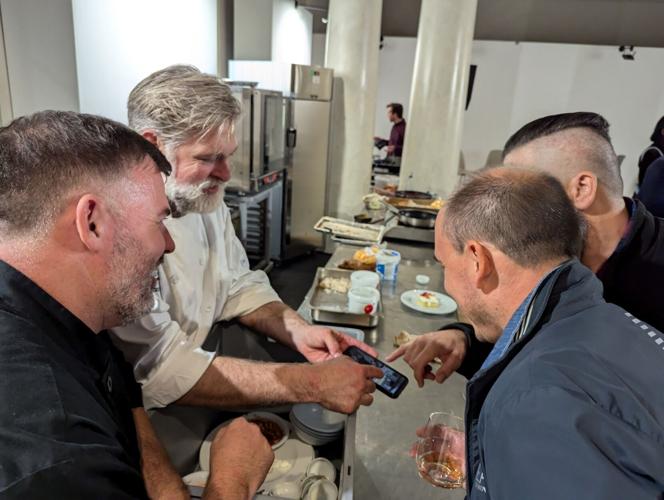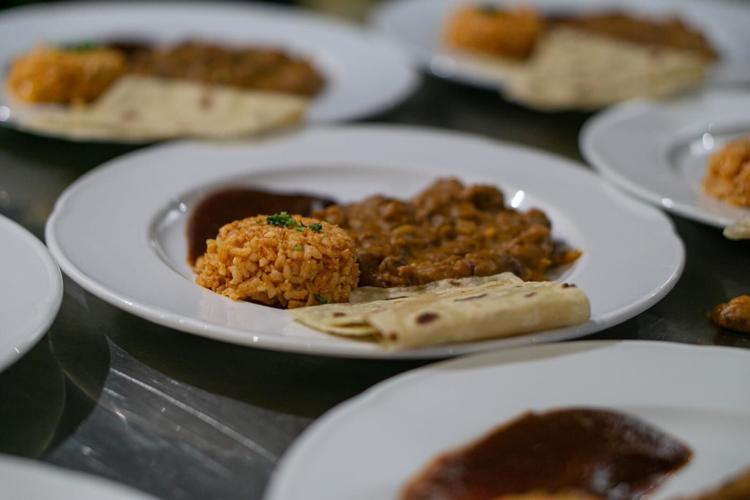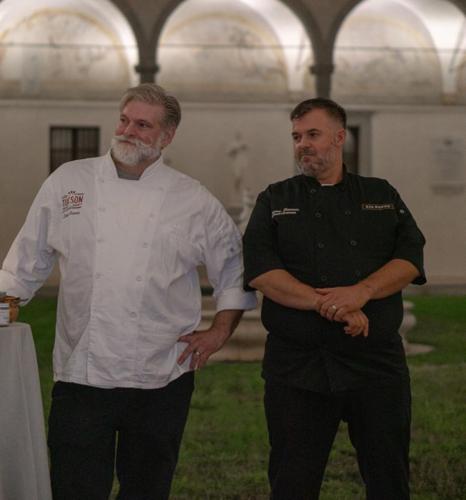In Parma, Italy, where they make the world-famous Parmigiano-Reggiano cheese and Prosciutto Di Parma ham, two Tucson chefs served a group of 50 Italians what was likely their first-ever tortilla.
The Parma group also experienced what was probably their first ever taco, made with carnitas and dressed with a trio of salsas, including one made with chiltepin peppers, and their first taste of slow-cooked birria, made from El Taco Rustico chef-owner Juan Almanza’s recipe.
“They were a bit wary of the spiciness,” said Jonathan Mabry, executive director of the Tucson City of Gastronomy. “It was only mildly spicy for any Tucsonan, but some of the dishes and salsa seemed spicy for their palates.”

Tucson chefs Mat Cable and Devon Sanner brought local heritage ingredients, including chiles and cholla buds, to Italy.
The dinner, presented last week in the courtyard of Parma’s historic St. Paul’s Complex, was the culmination of eight days that Mabry and Tucson chefs Mat Cable and Devon Sanner spent in Parma as Tucson City of Gastronomy Chef Ambassadors. The visit, which included meeting Italian chefs, sharing ideas on sustainability and ways to promote Parma and Tucson’s shared City of Gastronomy designations and eating their way across Parma in the city’s restaurants, came nine months after Parma chefs Mario Marini and Nicole Zerbini spent five days in Tucson in January.
Cable said he and Sanner, with help from Marini and other Italian chefs, prepared a five-course dinner to showcase Tucson’s food culture and heritage ingredients, many of which they brought with them from Tucson. Cable said he packed his suitcase with cholla buds, spices, chiles, red wheat and mesquite flour used to make the bread served in Cable’s Italian-Sonoran fusion restaurant Zio Peppe and white Sonoran wheat flour that they used to make the tortillas.
They also brought mesquite wood used to grill the carne asada served with frijoles made with mozzarella cheese instead of cheddar or Monterey Jack.
“It made the beans interesting and creamy,” Cable said.

Tucson chefs Mat Cable, left, and Devon Sanner, next to him, got an assist from Italian chefs when the pair prepared a Mexican meal for 50 in Parma, Italy, last week. The dinner was part of an eight-day Tucson City of Gastronomy Chef Ambassadors exchange.
Cable said the Italians were blown away by the tres leches cake made with Tucson’s Whiskey del Bac, but for Cable, the tortillas best connected the dots between the Parma City of Gastronomy and Tucson.
Father Kino, credited with introducing wheat to the borderlands in the 17th century, was Italian, so taking that wheat back to Italy “was kind of a full circle moment,” Cable said.
“Father Kino ... brought the wheat so it was kind of fun bringing it back to Europe and showing them what we did with it,” he said.
Mabry said he and his Parma counterparts pledged to continue the chefs exchange, which could include a visit by Italian chefs early next year. They also agreed to collaborate on the Tucson City of Gastronomy’s “Gastronomy of Climate Change” initiative that encourages chefs to “think more deeply about our climate future and how to sustain our heritage cuisine in the face of climate change,” Mabry explained.
Tucson COG and Parma COG agreed to encourage other cities of gastronomy to explore how to sustain their heritage foods in the face of dramatic global warming.
“In Tucson’s case, many of our heritage ingredients are already adapted to hot and arid conditions, which means that our ancient heritage ingredients can help feed us in the future and can potentially help feed other parts of the world,” Mabry said.

Devon Sanner, left, and Mat Cable represented Tucson in Parma, Italy, earlier this month as part of the Tucson City of Gastronomy Chef Ambassadors program.






